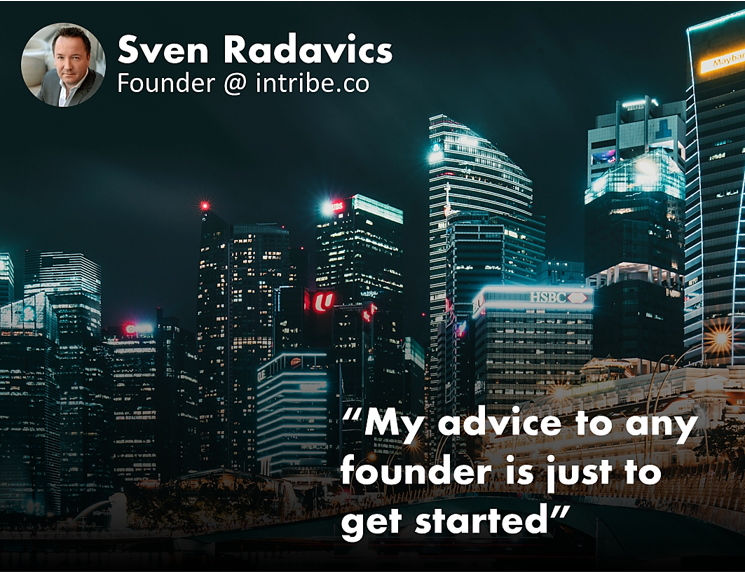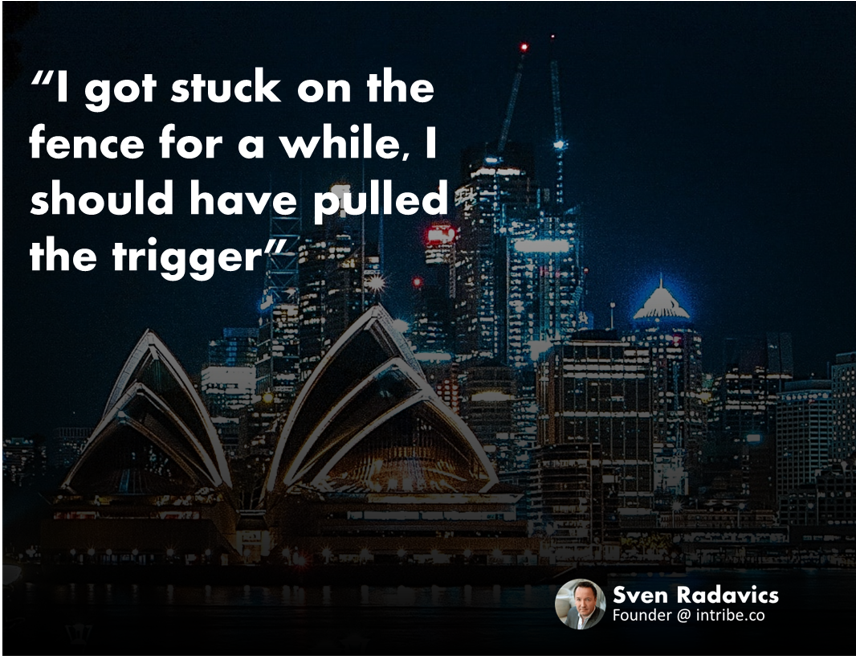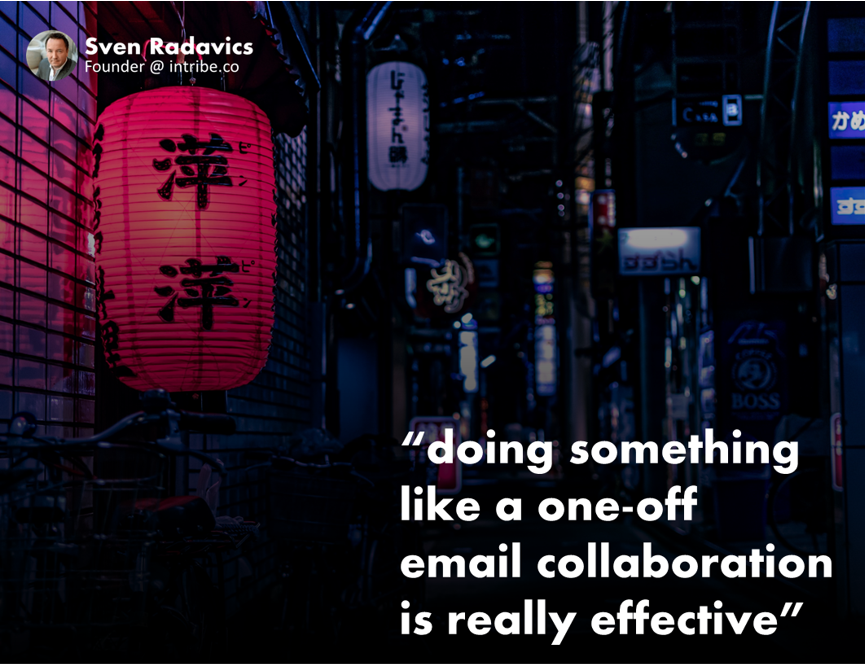11am on a rainy Monday morning in London, I jumped on a zoom call to talk “marketing” with my friend and founder of intribe – Sven Radavics.
Would you believe it, this is my 20th founder meeting of the month! 🚀
Sven had just finished his working day in Singapore, and as we got on the call, we immediately started kicking around some content marketing ideas. 🔥
I’ve known Sven now for some time and we talk regularly about content marketing, so it’s not uncommon for us to go off on tangents exploring ideas, and I love that.
Today was my opportunity to tap into his vast experience in Partnership Marketing. I’m hoping to find out how he started his company intribe and learn how my Startup could use partnership marketing as an effective marketing strategy to boost sales.
intribe is a partnership marketing platform for SMBs
So here goes….
Before we get into this month’s blog, I’d love to connect with you!
Soooo, let’s do it follow me on twitter (DMs always open) 📨

The advice from Sven is to get started today!
Thank you for joining and it’s been an absolute pleasure knowing you, I have to personally thank Eric Rafat of FoundersBeta for introducing us.
💡 Tell us about your background
I’m a first-generation Australian currently living in Singapore. Prior to that, I lived in Shanghai for a year, I spent some time in Seattle and lived in Tokyo for a while.
I’ve been involved with Startups since late 1997. Interestingly, I fell into partnership marketing purely by accident. I was previously an IP engineer, and I was involved in building some of the first commercial ISPs in Australia.
💡 Where did your Startup journey begin
I got involved with computer security by accident and fell into the security space whilst working for a Startup based in Seattle. Joining them as a sales engineer was the beginning of a long career in Startups.
I left the enterprise tech space behind and moved from sales engineering into a sales leadership/marketing position. This afforded me the opportunity to crossover into the consumer tech space with a company called Contour based in Seattle. Contour were a close competitor to GoPro for a number of years until they weren’t, but I’ll tell you more about that story another time.
💡 What has been your biggest challenge to date in this Startup journey

The biggest challenge for me really was the fact that I had other commitments. I got stuck on the fence for a while before I decided to go all-in a couple of months ago. I had the luxury of working with a number of Startups through a few accelerators and incubators which I got really comfortable with.
I was also on some advisory boards while I was consulting with some of the other Startups and that just kept me super busy. Then COVID struck and the world went through a pretty rough place. I was left with trying to work out how to balance the risk and reward situation.
If you can imagine, these Startups were paying me to help them raise investment and trying to raise investment for my own Startup would have sent out the wrong message. So, I was just stuck, unable to decide whether to cut my losses with my existing engagements and go it alone.
💡 How did you discover Partnership Marketing?
Starting my marketing career and having the experience and exposure I had with a Startup like Contour opened up so many opportunities for me. One such opportunity was in the consumer electronics space, where I found myself in a role at a Startup building audio product based in Chicago. This was how I met Joe, the founder of the company.
Joe Born was not a fan of marketing. He’d paid outrageous retention fees for agencies with zero return, he’d been burnt so many times by agencies and he just had a very dim view of marketing agencies.
I was building global sales channels and go-to-market strategies for these amazing Bluetooth Speakers but getting them to market was proving to be a challenge. As someone who was building global sales and moving a lot of stock into warehouses around the world, I needed a way to move products from the shelf into the hands of consumers. Which was where my brand building experience helped out.
We had a problem to solve, so Joe and I had frequent conversations around cost effective marketing. I regularly expressed to him that I needed some marketing help.
During one of our conversation Joe turned around in frustration and asked me for the best “return on investment” or ROI marketing out there. I sat back and reflected on the experience I had gained whilst working at Contour and here was my take on the situation.
Contour really exposed me to partnership marketing, they gave me the opportunity to see exactly how they had leveraged partnerships with Red Bull and Burton (a snowboard company) to create brand awareness and demand for their product.
This came with a lot of other side benefits, and we concluded that this was exactly what we were going to do for the high-quality Bluetooth speakers we were building.
Joe gave me the green light and said, “OK go and do it”, and off I went. I never really had an inside view of executing something like this before, having only ever been involved on the periphery at Contour, but I quickly realised that a lot of the work was very much a sales function.
💡 What are the main challenges you see with Partnership Marketing?
Marketers don’t gravitate naturally towards partnership marketing because it’s a “grind”. You’re out there building a list of brands you want to partner with, you’re doing a lot of research about the brands, and you’re involved with what’s effectively called sales outreach.
It can get very frustrating, especially when you have to knock on so many proverbial doors with a high percentage of rejection. Also, remember that I was already doing a day job that was 100% sales, and to have taken on a marketing role that turned out to be predominantly sales got me so frustrated that I thought, there had to be a platform for this type of marketing.
When I searched initially, I couldn’t find any other partnership marketing platforms. So, I decided to gather some friends together and started creating a platform as my side hustle. Unfortunately, I didn’t perform any due diligence on my friends (no one does right), and we hadn’t fully understood the amount of additional commitment it was going to take, but building the platform took way longer than I’d originally anticipated. I also kept getting distracted since I was still working with other Startups.
Those early-stage Startups required more of my time as they grew, then we get to 2021 and there’s a fundamental shift globally in marketing and advertising. Paid adverts are now under severe attack as they’ve become way too expensive for a lot of people.
💡 Do you see Partnership Marketing replacing Paid Advertising?
Brands can no longer afford to buy an audience anymore; I recently had some statistics and I think I actually have them here. In 2021 Facebook ad costs were up 89% year on year, advertising prices jumped 30% just between Q1 and Q2 this year so you know it’s quite an extraordinary situation.
Things are only going to get worse since iOS 14 and the blocking of tracking. Google has made some statements about third party tracking cookies and you know we don’t really see advertising getting any easier and a lot of brands are looking for alternatives as I saw this develop over this year, I realised it was time to go all in.
💡 How can intribe help Startups to succeed?

intribe is for Startups and SMEs across the board. Our ideal customers are typically organisations with a dedicated marketing manager maybe one or two people on the marketing team but, without a dedicated partnerships manager.
Startups typically have financial constraints, therefore partnership marketing can bring huge benefits to early-stage cash strapped Startups since partnerships bring a high ROI especially where advertising spend is very challenging.
Partnerships can effectively be free since a partnership could be as simple as two brands, one with 1000 strong email list and another one with an 800 strong email list coming together and just dropping an introduction to the other brand. That’s a legitimate partnership activity and often a really good way for early-stage Startups with limited funds to engage in partnerships. A lot of people worry about the complexity of setting up a partnership and if you’re going to Co brand a $2000 product then you’ll need thousands of dollars in legal fees to set up the relationship. That’s an awful lot of work and complexity and that has every chance of going horribly wrong
Doing something as simple as a one-off email collaboration is so low risk, if it doesn’t work out you can both move one without involving your lawyers and it allows for an opportunity to try again in the future.
💡 Please tell us how you came up with the name “intribe”?
The name itself was formed from the concept of “building your tribe”. There was a lot of talk in the last decade, particularly in the consumer space, specifically about how people tend to gravitate towards their tribes.
You know skate boarders, mountain bikers and environmentalists all have their tribes. These are likeminded people often on a mission together. That was what was really appealing to us about the name, the thought of building your own tribe of small brands all coming together to take on the larger brands.
The actual process of finding a name was much less glamorous though. We registered about
20 to 30 different domain names. Then my previous collaborator and I sat for hours trying to come up with descriptive names like “Partner Amp” and “Partner Den” until we eventually arrived at intribe.
Every way we looked at it confirmed to us that Intribe was the right name for us. We could get the .co and the .io domain names, everything but the .com but we were happy with intribe. It represented what we were about
💡 What would be your advice to a 1st time founder?
The advice from me would be to jump straight into Startup as quickly as possible. I think the best way to learn with Startups is by “doing”. You can spend a lot of time reading and attending training courses, but the sooner you get started, the sooner you’ll build a real Startup.
I’m not saying don’t read books or don’t talk to people, I’m just saying you should start putting everything you’re learning into practice.
You don’t have to start big trying to raise a $1MM seed investment round, you can simply start by creating a newsletter around a specific topic you’re passionate about and provide a service to that target market.
Once you start to engage with them, you’ll find out how they respond to your content. The next step could then be to build a Startup around their pain points.
💡 How can we help you Sven?
So, closing off this interview, I know that you’re currently fundraising and I’d love to find out how can we help you?
Thanks for asking Olu, I’m looking for full stack developers right now with a MEAN stack skillset. That’s my immediate need at the moment. In terms of additional skillset, I’m also looking for continuous integration and deployment of automated testing.
Since writing this piece, I’m excited to share that Sven has found 2 amazing developers and the product build is now accelerating. 2022 is looking to be a blockbuster year for intribe and we can’t wait to see the incredible growth they truly deserve.
Congratulations Sven and we’re looking forward to seeing you guys do big things next year! 🚀
On twitter : 🐤 @oluadedj
subscribe : 📰 prelo newsletter
Until the next time!
Olu
Founder, Prelo
I tweet about helping founders win!
main image provided by Photo by Liam Drinan on Unsplash 🙏
main image provided by Photo by Jase Bloor on Unsplash 🙏
main image provided by Photo by aaron boris on Unsplash 🙏



